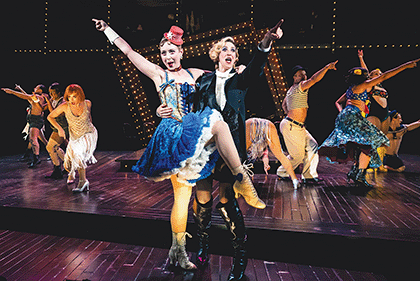By ELANA WARREN / Assistant Editor
On the Wurtele Thrust Stage at the Guthrie Theater in Minneapolis, people are gay — they are happy. They are comfortable in their sexuality. “People are people,” as the character Sally Bowles (Mary Kate Moore) says. They have artistic freedoms, among others. And then the world starts to change around them.

But the setting is not the United States in 2022 when the Supreme Court overturned Roe v. Wade, or now in 2025 when President Donald Trump prohibited gender self-identification on federal documents and the use of the word “gender” as opposed to “sex.” No, it’s 1929 Berlin.
At first, Cabaret at the Guthrie only alludes to the political climate — it relies on audience knowledge of history to get the hints that the Nazis are rising to power. And it is subtle for the characters too. They feel safe.
But then as Nazism creeps into everyday life, the climate quickly goes from the fun “life is beautiful” to fear, prejudice and denial. As the American novelist character Clifford Bradshaw (Jason Forbach) says, “It was the end of the world.”
This musical is one of few shows I’ve seen where there was silence rather than applause at the end. But that’s due to the chilling finale of this staging, so don’t mistake that for a bad performance. The production features a talented cast portraying a mysterious and playful Emcee (Jo Lampert); conscionable Cliff, lovable and naive Herr Schultz (Remy Auberjonois); resigned Fräulein Schneider (Michelle Barber); and emotive Sally. Moore takes the audience through joys and heartbreaks and received loud applause for her multiple solos, including “Maybe This Time.”
Cabaret, by a Jewish writing team — Joe Masteroff, book; John Kander, music; and Fred Ebb, lyrics — premiered on Broadway in 1966 and won 11 1967 Tony Awards. The Guthrie production, under the direction of Artistic Director Joseph Haj, is powerful and intense. The plot is supported and broken up by the Emcee’s spectacular — and carnal — cabaret vignettes with pointed metaphors.
While Cabaret’s Kit Kat Klub is a fictional representation of the Berlin cabaret scene in the Weimar era between the First and Second World Wars, it accurately features singing acts as well as dancing and even political satires and parodies. A real-life example: Jewish German composer Friedrich Hollaender wrote the cabaret song “The Jews Are To Blame for Everything” to satirize antisemitic attitudes.
So why do politics matter? How does politics affect us? And what would you do if you witnessed this turn of tides in society? Cabaret poses these questions and ventures into the difficult path of the common good but also the very human path of self-preservation.
Without changing the historical setting, Cabaret is plenty timely. “What would you do?” is the same question we ask ourselves when we see the headline: “Texas bill would make identifying as transgender a felony punishable by jail” (March 2025, NBC News) or “Immigration officers intensify arrests in courthouse hallways on a fast track to deportation” (June 2025, Associated Press).
Cabaret gives us what could have been a love story — two love stories — if it weren’t for political upheaval. It shows us the consequences of inaction and how fascism slowly corrupts. And it takes the viewer through various emotions — the Emcee keeps the audience entertained, making people laugh but also uncomfortable, maybe confused and, later, somber. And, hopefully, introspective.
***
Cabaret is playing on the Guthrie Theater’s Wurtele Thrust Stage through Aug. 24. The Guthrie is located at 818 S. Second St., Minneapolis. For tickets and information, call 612-377-2224 or visit: guthrietheater.org.
(American Jewish World, August 2025)



















